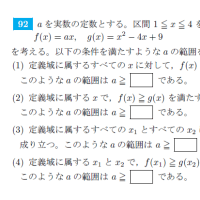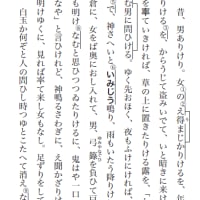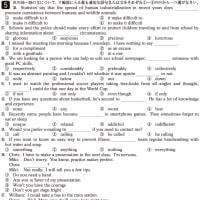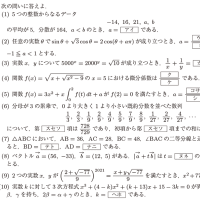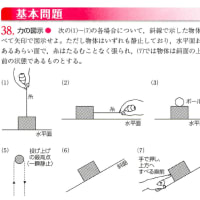いきなり難問、分からない。
解答・解説、意味不明。
添削が、戻ってくるまで時間がない。
暗記だけでは歯が立たない。
キミのつまづきはどこからだ?
さくらの個別指導なら質問OK!
「なぜそうなるか」がスッキリわかる。
問題数をこなして分かるなんてナンセンス。
入試は量じゃない。
質で選ぶ、本命合格のための確実な実戦力養成方法。

6) 夜遅くまで起きてユーチューブの動画を見てしまった。
I ( ) ( ) ( ) ( ) ( ) watching videos on YouTube.
7) 就職してから外食が増えた(←働き始めてからより多く外食をしている)。
Since I started working, I've been ( ) ( ) more often.
8) 昨日は寝坊してしまい、学校までずっと走らなければならなかった。
Yesterday I woke up late, so I had to run ( ) ( ) ( ) to school.
9) チャーリーは今外出中です。昼までには戻ります。
Charlie ( ) ( ) right now. He'll be back by noon.
10) 昨晩怖い夢を見た。
I ( ) ( ) scary ( ) last night.

文章17 心と身体は別のもの? 東北大学
人間は、どのように進歩してきたのだろうか。進化論的に解せば、宇宙には無機物の物質の世界があり、そこから生物が生まれ、動植物が枝分かれするような形で生じ、種と類がより複雑に進化していった。人間もまた、そうした単純から複雑への生命の進化過程から生じたわけである。これはつまり、一つの物質がより複雑で高い次元に発展するという【一元論】の発想である。
では、人間の進歩はこのような一元論的な考え方でのみ理解できるものだろうか。ここでは個人に問題を絞ろう。通常、生理的発展によって人は身体的に大人となる。つまり食べたり寝たりといった日々の暮らしを続けていれば、自然と身体は成長する。そうして生物学的な意味では、人間はほぼ二十歳で進歩を止めるのだ。しかし人間の進歩を生理的発展という一元的な観点からしか見ないのは、いかにも不十分である。例えば人間の実質的な進歩を身体と精神の【二元論】的なそれだと見れば、身体の生理的発展に対し、精神の成長を考える必要が出てくる。
デカルトは精神と身体(物質)を、互いに依存しない別個のものと見なしたが、それが近代以降に説かれるようになった【心身二元論】である。この考えでは、精神を【主観】とし、身体を【客観】と見なして世界が認識されることになる。身体の成長が二十歳ほどで完成するのは客観的事実である。では精神はどうか。人間が大きな仕事をなすことの多い四十から五十代の働き盛り、もっと身体的に衰える老年期に精神は完成されるものだろうか。はたして人間の精神的進歩の段階を測るものさしはあるのか。あるとすれば、それは甚だ主観的で、【独我論】的な計測法を持ったものとなるだろう。主観を持った人間主体にとって、依拠すべきと信じる事象はこの主観しかないからである。
Sentence 17 Mind and body are separate things? Tohoku University
"I wonder how humans have progressed." From an evolutionary perspective, there is a world of inorganic substances in the universe, from which living things were born, animals and plants branched out, and species and species evolved in a more complex way. Human beings also emerged from such an evolutionary process of life from simple to complex. In other words, this is the idea of [monism] that one substance develops into a more complex and higher dimension.
Then, can human progress be understood only through this kind of monistic way of thinking? Let's focus on the individual here. Physiological development usually makes a person physically mature. In other words, if you continue your daily life such as eating and sleeping, your body will naturally grow. And so, in a biological sense, humans stop progressing at about the age of twenty. However, it is very inadequate to see human progress only from the one-dimensional point of view of physiological development. For example, if we consider the substantive progress of human beings as a [dualism] of the body and the spirit, we need to consider the growth of the spirit in contrast to the physiological development of the body.
Descartes considered the mind and body (material) to be independent and independent, and this is the [mind-body dualism] that has been preached since the modern era. In this way of thinking, the world is recognized by regarding the mind as [subjective] and the body as [objective]. It is an objective fact that the growth of the body is completed at the age of twenty. What about the spirit? Will the spirit be perfected in the prime of life in the 40s and 50s, when people often do big jobs, and in old age when they are physically weaker? Is there really a yardstick for measuring the stages of human spiritual progress? If there is, it will be something with a highly subjective, solipsistic metric. This is because subjectivity is the only phenomenon that a subjective human subject believes to rely on.












